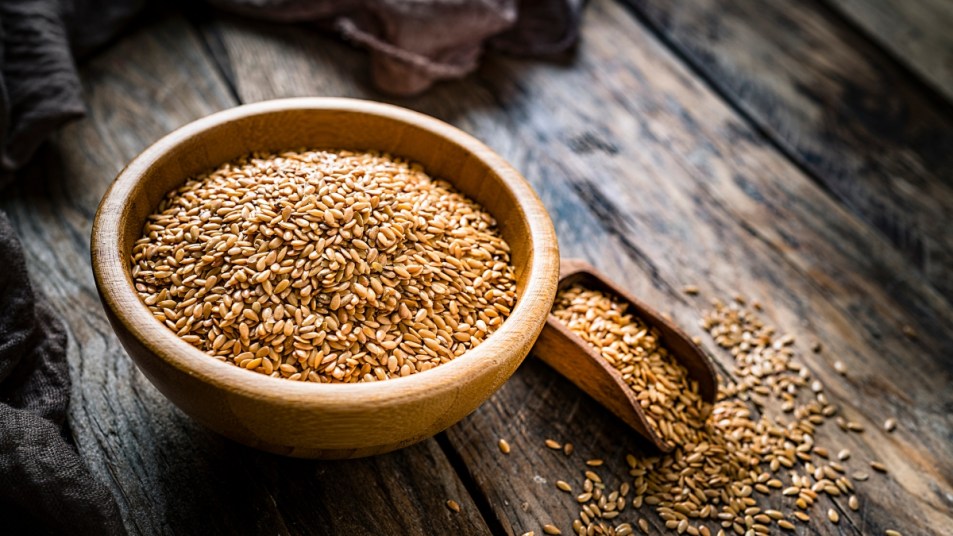Eating More of This Delicious Snack May Lower Your Risk of Heart Disease and Death

If the fall season makes you think of nuts, that’s a good thing! Nuts and seeds are health food staples because they’re so densely packed with nutrients. From pecan granola to pumpkin seed bread, these little crunches of protein are the perfect addition to any dish. To take it a step further, a fatty acid in nuts, seeds, and plant oils may reduce your risk of heart disease and death.
Many nuts and seeds contain the alpha linolenic acid (ALA), a type of omega-3 fatty acid. Good sources of ALA include flaxseed, grapeseed (which is used to make canola oil), walnuts, and soybeans. According to a 2021 review published in The BMJ, eating more omega-3s instead of saturated fats and trans fats can do a world of good. The research showed that this nutrient is linked to a lower risk of death.
The Link Between Alpha Linolenic Acid and Better Health
A wide body of research already shows that a high intake of ALA decreases the risk of heart disease. However, previous studies did not find a definite link between ALA and a lower risk of death. To find an answer, the research team for The BMJ review analyzed 41 previous studies on this omega 3 published between 1991 and 2021. Then, they looked for links between ALA and risk of death from heart disease, cancer, and all causes.
All in all, the researchers looked at data from over 1.2 million participants across all 41 studies. They noted that over 198,000 participants died from all causes and over 62,000 died from cardiovascular disease. Over 65,000 died from cancer as well.
The review authors made sure to account for variables like weight, smoking status, alcohol usage, and exercise, which could make their conclusions inaccurate. They also evaluated each study they used for bias. After analyzing the data, the team noticed that a higher intake of ALA reduced the risk of death from all causes by 10 percent. It also reduced the risk of cardiovascular disease by 8 percent and the risk of coronary heart disease by 11 percent.
The researchers also found that alpha linolenic acid caused a dose-response effect. In other words, the greater the intake of ALA, the lower the risk of death. An increase of 1 gram per day of this omega 3 lowered the risk of heart disease-related death by 5 percent. You can find that amount of ALA in one tablespoon of canola oil or half an ounce of walnut oil.
Of course, there were a few issues with the study. An uptake of this fatty acid was also linked to a slightly higher risk of death from cancer. (The team did note that they would need more research to confirm this finding.) Plus, the nature of the research meant that the authors couldn’t say that ALA directly caused a lower risk of death.
Still, the research is valuable. It shows us that nuts, seeds, and their oils may improve not just our heart health, but our overall health.
Eating More Nuts and Seeds
With these newfound health benefits in mind, it’s a good idea to incorporate more alpha linolenic acid into your meals. Nuts, seeds, and soy fall into the protein category for U.S. dietary guidelines. However, nuts are measured differently because they’re so calorie dense. A single ounce of nuts is actually equivalent to 2 ounces of protein, according to the U.S. Department of Agriculture.
So, if you are on a 2,000 calorie diet, you should eat about 2 ounces of nuts, seeds, and soy products each week. Just remember that 2 ounces of nuts is the equivalent of 4 ounces of protein! If you are on a 2,000 calorie vegan diet, you should eat about 7.5 ounces of nuts, seeds, and soy per week. That equals 15 ounces of protein.
You may also be wondering how much nut and seed oil to consume. The University of Maine states that women on a 2,000 calorie diet can eat 5 or 6 teaspoons of oil daily. However, a lot of products we eat that already have oil and fat (like mayonnaise, Italian dressing, and avocados). There might not be much room to add a spoonful of vegetable oil to your food. In other words, go easy on the nut and seed oils! But if you are going to use oil in your cooking, try walnut or canola.
Ultimately, two ounces of nuts per week is an easy goal to achieve. Blend some walnuts into your smoothies and top your avocado toast with flaxseed. Before you know it, you’ll have more alpha linolenic acid in your diet than ever before.
















